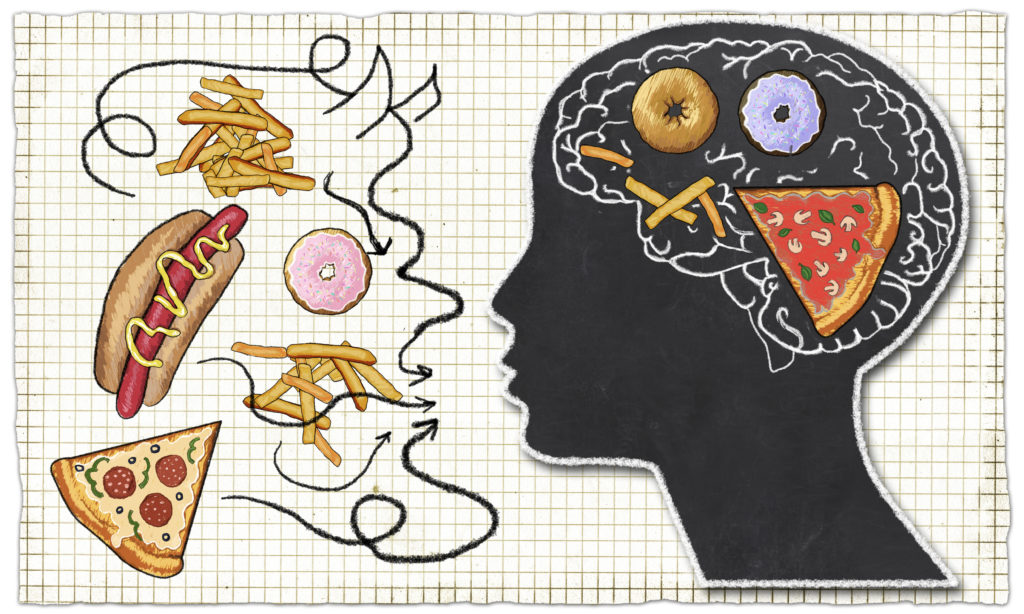Quick Hits
Daily brief research updates from the cognitive sciences

Is weight loss all in the mind?
Well, with the danger of oversimplifying a complex topic, this latest research shows it is, and shows precisely how and with what networks. So, what did these researchers find?
The goal of this study was to measure the effectiveness of a behaviour-based (a good old-fashioned diet with restriction of calories) weight loss intervention. This was carried out by Jonathon Burdette and his team – they had previously identified two networks that are related to weight loss. These, called Functional Network 1 and 2 in this study (FN1 or FN2) with FN1 a network related to sensory and motor control and FN2 related to attention and cognitive control.
Participants were scanned in resting state (while doing nothing) and then after completing a food-cue task. They then completed a 6-month programme for weight loss and their results measured and then compared to their brain scans. What did they find?
They found that those who failed to lose weight had higher activity in FN1 in the resting state and lower activity in FN2 after the food-cue task. This may not sound clear but what it actualyl suggetss is those who had trouble losing weight had a higher natural desire to search out and find food in a resting state combined with inhibited or lower emotional regulation, control, and focus in the presence of food.
This therefore suggests that even in resting state the brain is activated differently and rather than a question of simple will power, it is different neural activation patterns – which may be less of a problem “in the wild” but in modern society when there are food cues everywhere, this can be obviously problematic.
The researchers don’t give any tips at this stage, but it is a step forward in understanding some of the challenges and dynamics of weight loss and getting obese in the first place. It also shows that a more individualised approach is necessary because individuals face different challenges.

Andy Habermacher
Andy is author of leading brains Review, Neuroleadership, and multiple other books. He has been intensively involved in writing and research into neuroleadership and is considered one of Europe’s leading experts. He is also a well-known public speaker speaking on the brain and human behaviour.
Andy is also a masters athlete (middle distance running) and competes regularly at international competitions (and holds a few national records in his age category).
Reference
Jonathan H. Burdette, Mohsen Bahrami, Paul J. Laurienti, Sean L. Simpson, Barbara J. Nicklas, Jason Fanning, W. Jack Rejeski.
Longitudinal relationship of baseline functional brain networks with intentional weight loss in older adults.
Obesity, 2022; 30 (4): 902
DOI: 10.1002/oby.23396
More Quick Hits
Engaging Leadership Boosts Employee Engagement, and Team Effectiveness, and Resilience
Quick HitsDaily brief research updates from the cognitive sciences paper just out has looked again at leadership style and impacts on employee engagement and also various team effectiveness measures. Greta Mazzetti of the University of Bologna,...
When Cognitive Games Do Make You Smarter
Quick HitsDaily brief research updates from the cognitive sciences ognitive games have been around for many years now – the first wave of popularity came with Nintendo’s “brain jogging” almost two decades ago now. These games have claimed that they...
How Walking Makes Some People “Super Taskers”
Quick HitsDaily brief research updates from the cognitive sciences hose of you who have followed my writing will know that I have reported regularly on the amazing benefits of exercise and walking on the brain, body, and cognition. However, though...
Older People are Better at Responding to Distress
Quick HitsDaily brief research updates from the cognitive sciences e may have some cliched ideas of older people like the grumpy or angry old man, or woman (but it is often a man). However, research continually shows the opposite. Namely that...
Guided Play Highly Effective for Learning in Children
Quick HitsDaily brief research updates from the cognitive sciences ood news for some and bad news for traditionalists in education. Some believe that starting education early and using classical and traditional learning activities is the best way...
Childhood Fitness Improves Mid-Life Cognition
Quick HitsDaily brief research updates from the cognitive sciences always find these long-term studies fascinating. Imagine launching study and not knowing what the outcomes will be for another 30 years! This is precisely what this study did. It...






